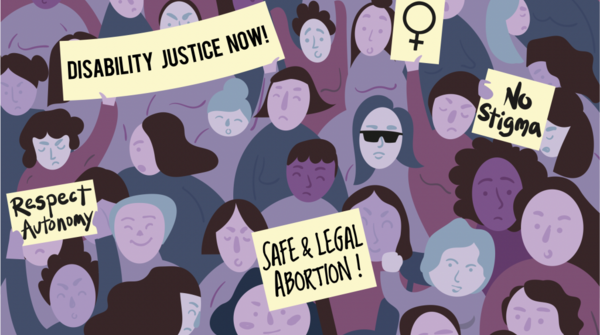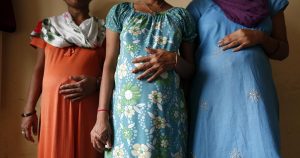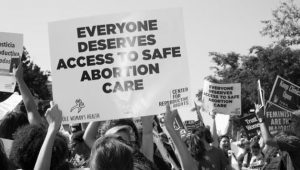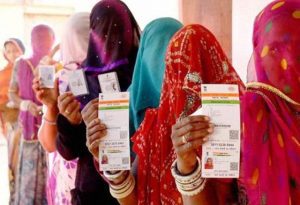India’s Laws Fail To Uphold Abortion Rights Of Women With Disabilities

Arpita Roy Sengupta was 22 years old when her parents, much against her wishes, arranged her marriage in 2007 with Alok*, a deaf person like her. Still in her second year of graduation, she had wanted to complete her studies. Her husband and mother-in-law, however, wanted her to get pregnant.
After missing her period a few months after her wedding, Arpita visited a gynaecologist who confirmed her pregnancy.
“I did not know much of what happened inside the office that day,” Arpita told Behanbox through Alka Nanda Joshi, a sign language interpreter, “I was asked to wait outside after the check-up while the doctor spoke to my mother-in-law.”
After the visit, her mother-in-law gave her a few tablets. Within the next few days, Arpita began to bleed heavily and eventually lost her baby.
“I found out later that the pills my mother-in-law gave me were abortion pills. They had found out that the baby was a girl”, said Arpita.
Arpita’s family and the doctor violated a clutch of laws surrounding abortion in India. Along with the Pre-Conception & Pre-Natal Diagnostic Techniques Act of 1994 which makes sex selective abortion a cognisable offence, they also committed a non-bailable offence under section 313 of the Indian Penal Code (IPC), when they terminated her pregnancy without her consent.
“I was scared and clueless about what was happening to me. I was too young then and not aware of any of these things”, said Arpita.
Women with disabilities are able to exert limited agency over their bodies and have equally limited access to sexual and reproductive rights. Driven largely by societal attitudes, this exclusion is further compounded by the opacity in laws governing abortions in India. The lack of synergy between the Medical Termination of Pregnancy Act (1971), the main law around abortions and other legislations like the Mental Healthcare Act and Rights of Persons with Disabilities Act (RPWD) has created confusion, making access more complicated, legal experts told BehanBox.
While access to safe abortion is an issue for many women in India, women with disabilities face added barriers in accessing these rights. These include inaccessible healthcare facilities and information, insensitivity of healthcare workers and the overall infantilisation and invisibilisation of women with disabilities. Limited data and research makes understanding the gravity of these issues difficult.
Denial of access
In 2015, the Post Graduate Institute of Medical Education & Research (PGIMER) in Chandigarh conducted a study with 50 women with disabilities to understand the barriers they face in accessing sexual and reproductive healthcare. Of these, 78% had locomotor disability, 8% were blind and 6% were deaf.
36% of women with disabilities in the study reported physical barriers in accessing the facility. This included no ramps or transportation and inappropriate examination tables. Nearly a quarter (22%) cited long waiting hours and 20% stated inaccessible toilets as impediments. A smaller proportion (8%) said that the attitude of healthcare providers was a barrier and 6% of the women reported that assistance would have helped them access the facility better.
Though small, this study is the only one of its kind in India that explores the barriers that women with disabilities encounter while accessing abortions and other sexual and reproductive healthcare services. While the study focuses largely on physical barriers, there are other overarching information and attitudinal barriers that prevent women from accessing these facilities.
Societal perception is one of the biggest barriers, said Shampa Sengupta, an activist working for disability and gender rights. “Women with disabilities are not expected to be mothers. People think they cannot take care of their children once they are born.”
Rohini* (41), who is partially blind, knows this well. In 2012, she visited a gynaecologist when she suspected that she might be pregnant.
“The moment she looked at me, she had an awkward expression on her face which made me uncomfortable,” Rohini recounted in an email.
“When she asked me the reason for my visit, I told her that I had taken a pregnancy test which showed two strips. ‘Was I pregnant?’”. The doctor, in a plain tone, confirmed that she was.
An uncomfortable silence followed. Rohini had expected the gynaecologist to congratulate her, just as she had seen in films. Instead, she had to break the silence to ask the doctor what she needed to do next. The gynaecologist, in turn, asked her if she wanted to continue with the pregnancy.
“I had not even thought of terminating my pregnancy,” Rohini said, “She assumed that herself because of my disability.”
Perceptions about women with disabilities as incapable mothers or indeed, as assexual beings prevents them from accessing crucial information pertaining to sexual and reproductive rights
“A lot of the information material is not available in a way that women with disabilities can access,” said Suchitra Dalvie, a gynaecologist and coordinator of Asia Safe Abortion Partnership (ASAP). “Even if they may otherwise be able to read or listen, women with disabilities are seen either as hypersexual or asexual, who either need to be controlled or protected. There is no space where they are recognised as potentially sexual beings and are, therefore, offered the information they need to figure out what they want to do.”
Attitude of healthcare providers is another deterrent for women in accessing reproductive healthcare.
When Rohini went to get her pregnancy related tests, the receptionist, without checking her papers, directed her to the ophthalmologist’s desk. She had to navigate the two ends of the huge hospital to finally get her prescribed pregnancy tests.
“It was a very frustrating situation. I had gone to the hospital by myself and had a hard time reading the signage in the hospital. What was worse was that the receptionist presumed that I had come for an eye test because of my disability”, said Rohini.
A 2018 working paper by Talking About Reproductive and Sexual Health Issues (TARSHI), a Delhi-based non profit organisation, illustrates the ordeal faced by a woman with a visual disability when she went to a clinic for abortion. Instead of explaining the procedure to her, the staff at the clinic gave her a form that she could not read. Without verbal assistance, she was left feeling vulnerable and scared.
Physical access apart, women with disabilities find it hard to access tools around pregnancy that can aid their decision making. Blind women are unable to read the results of over-the-counter pregnancy tests and require external assistance, which affects their privacy.
“The urine pregnancy tests are a very recent invention,” said Dalvie. “Until the 1960s, rabbits were used to find out if a woman was pregnant.” The rabbit test involved injecting the urine of the woman into a rabbit and waiting for the rabbit to be killed a few days later to check for cysts. If the ovaries had cysts, the woman was thought to be pregnant.
“In the last 60 years, if we could innovate a one minute pregnancy test that can be bought over the counter for Rs 40, then you would think that there exists technology that is accessible for blind women. But it doesn’t ”, said Dalvie.
Who makes the decision?
These barriers in accessing sexual and reproductive healthcare services rob women with disabilities of crucial choices and decisions about their bodies–decisions such as whether they want to continue with the pregnancy.
“No one asks the pregnant woman if she wants to be a mother or not”, said Sengupta. “This is especially true with deaf women and women with intellectual disabilities.”
Medical professionals make this alienation worse by ignoring their very presence and talking to their caregivers instead. This not only invisibilises them but transfers their agency to other family members or caregivers.
After her unpleasant consultation with the earlier gynaecologist, Rohini began consulting a different doctor. In every visit, the new doctor directed her attention to her husband.
“Most of the time, she used to look at him while giving instructions, which bothered me,” she said, “At times, when I asked her questions, my husband would cut me off mid sentence and laugh, as if I were asking a question with obvious answers. That hurt me.”
“I expected the gynaecologist to ignore my husband and answer my queries. But she did not”, said Rohini.
For deaf women, access is further complicated as hospitals do not have sign language interpreters. This forces them to be reliant entirely on caregivers and family members, eroding both their privacy and agency.
“Since there is no direct contact between the medical professional and the patient who is a deaf person, there is no confidentiality”, Saudamini Pethe, a deaf lawyer told Behanbox through an interpreter. “If a woman wants to get an abortion and her parents or family are against it, how can she get it done? Even if she goes to the hospital alone, the doctor will ask her to come back with her parents or family members.”
This was the ordeal that Arpita went through when her doctor asked her to step outside during her consultation and discussed her pregnancy with her husband and mother-in-law.
“They would always prefer a family member to communicate on our behalf, which is not appropriate at all,” said Pethe, “It is not ethical. You are discussing the health condition of a person without even communicating with that person. This leads to misinformation and is dangerous. The interpretation needs to be done by a sign language professional who can interpret with clarity what the doctor is saying.”
“Usually, the doctors speak with the family members for around thirty minutes.Then, they show the prescription to the patient, point at the medicines and show two or three with their fingers to indicate the frequency of intake,” said Pethe.
Infantilising women with disabilities, especially those with intellectual and psychosocial disabilities, by their caregivers is another way in which their right to make decisions is taken away.
“We don’t find many women with intellectual and psychosocial disabilities talking to us,” said Sengupta, “Usually family members use the term ‘bacchi’ (child), even for adult women. While it is a general term for a child, the way it is used for disabled women highlights the infantilisation.”
Women with mental illnesses may also require additional support in making decisions, which is often denied to them. Sakshi* (27) who lives with bipolar disorder wishes she had someone to support her, explain the situation and her options when she found herself pregnant. During one of her manic episodes in November 2014, when she was “hyper sexually active”, Sakshi had unprotetected sex. She missed her period but did not pay much attention to it as they were normally irregular. A urine pregnancy test in February showed she was pregnant. When Sakshi told her sister and the person that she had had sex with, about the pregnancy, she didn’t get a reaction she had hoped for.
“Both of them told me to get an abortion. Neither of them asked how I was doing or indeed, if I wanted to get an abortion”, she said.
The few friends she confided in stopped speaking to her. The gynaecologist her sister took her to, gave her abortion pills and said that she was doing her a favour.
“I was very shocked. How is this a favour?,” asks Sakshi.
Depressed and unsure, Sakshi struggled to make sense of the situation. “I wondered if finding out late might be a sign for me to continue with the pregnancy.”
Neither her sister nor her partner were supportive of her decision nor helped her understand. Her partner’s sister, who appeared to be supportive at first, merely wanted to ‘fix the problem her brother had created’, Sakshi told Behanbox. Eventually, she got an abortion when she was fourteen weeks into her pregnancy.
“I was alone at the clinic that day”, Sakshi recalls. The entire experience, she says, was lonely and it took her years to recover from the trauma.
Sometimes, doctors also have a lot of say in making these decisions for their patients. For a person with schizophrenia, the gynaecologist or the psychiatrist may end up deciding whether they should continue with their pregnancy, said Reshma Valliappan or Val Resh (as she is also known), a schizophrenist, activist and an artist.
“I know a woman who lives with schizophrenia, whose family recognised her need for motherhood, but the psychiatrist did not. She was on certain medications and was never briefed by her psychiatrist that she needed to convey this to her gynaecologist. That endangered her.”
A lot of gynaecologists are against medication given to women, especially if they want to conceive, said Valliappan. “The opposite is also possible where the doctors may be in support but the family is not.”
Opaque laws
India’s laws act as another barrier, especially for women with intellectual and psychosocial disabilities, in asserting their agency over their bodies.
The Medical Termination of Pregnancy Act (MTP Act), the main law that frames abortion rights in India, states that “no pregnancy of a woman, who is a mentally ill person, shall be terminated, except with the consent in writing of her guardian.”
“The MTP act forces a form of guardianship on women with certain kinds of disabilities–mainly intellectual and psychosocial disabilities,” said Rupsa Mallik, who was until recently the director of programmes and innovation at CREA, a feminist international human rights organisation.
The 50-year-old law has been amended only twice–once in 2002 when the word ‘lunatic’ was changed to ‘mentally ill person’ and in 2021 when it increased the gestational limit for abortion from 12 weeks to 20 weeks.
“The law does not have a clear definition of who a mentally ill person is. It is left for individual interpretation, said Mallik, “The definitions are complicated, opaque and mean very little.” The MTP act defines a mentally ill person as “a person who is in need of treatment by reason of any mental disorder other than mental retardation”. Until 2002, when the law was amended to change ‘lunatic’ to a ‘mentally ill person’, it defined ‘lunatic’ as “an idiot or a person of unsound mind” as per the Indian Lunacy Act of 1912.
Activists and experts hoped that the 2021 amendment of the MTP act would incorporate the more progressive definition of mental illness from the Mental Healthcare Act (MHA), an act that replaced the Lunacy Act in 2017. But the government of India missed that opportunity.
“The Mental Healthcare Act is one of the most progressive health legislations in the country. In our internal conversations, we had suggested that the ‘mentally ill person’ part in the MTP act be amended and be defined in the context of the Mental Healthcare Act”, said Dipika Jain, Professor of Law and the Director of the Centre for Justice, Law and Society (CJLS) at Jindal Global Law School (JGLS).
The lack of synergy between the laws might create a lot of confusion in future, believes Anubha Rastogi, a lawyer.
“Because there is such a lack of clarity in the definition of who a mentally ill person is, doctors will insist on the guardian’s consent to safeguard their own interests. So the privacy of that person, especially if she is an adult, goes out the window”, said Rastogi, who has co-authored two reports analysing court judgements on abortion by Pratigya Campaign, a network of individuals and organisations working for women’s right and access to safe abortion.
The confusion mentioned by Rastogi and others had been witnessed for decades in legal cases and jurisprudence involving abortion rights for women with disabilities.
The landmark Suchita Srivastava case in 2009 set the conversation around abortion rights of women with disabilities. In that year, a woman with intellectual disability got pregnant after she was raped, while living in a government welfare institution. Her guardian, the Chandigarh administration, filed a petition in the Punjab and Haryana High Court for medical termination of pregnancy. Despite stating that she wanted to continue with the pregnancy, the High Court, based on inputs from an expert body, granted the state the permission for abortion.
The Supreme Court overruled the High Court judgement and concluded that the woman had the right to continue her pregnancy. The judgement recognised women’s reproductive autonomy to be integral to her rights to personal liberty under Article 21 of the Constitution. Despite this observation, the Court did not strike down the provisions of the Medical Termination of Pregnancy Act, 1971, that allow for forced abortion of women with psychosocial disabilities, according to the initial report, submitted by the Government of India. The report highlights the progress India has made towards its commitment under the United Nations Convention on the Rights of Persons with Disabilities (UNCRPD).
However, many courts are using this judgement to create an additional barrier for rape victims in accessing abortions. Judges are taking extra measures like interviewing survivors in open court or in chambers to ensure consent for abortion, found a review of court cases on abortion by the Centre for Health Law, Ethics and Technology at the Jindal Global Law School.
In a similar case in 2015, the Gujarat police picked up Sunitaben, a “wandering mentally ill woman”, who was later found to be fourteen weeks pregnant. The Chief Metropolitan Magistrate, based on the recommendation of a medical team including a gynaecologist and a psychiatrist, directed a government hospital to terminate the pregnancy. The Gujarat High Court upheld the judgement stating that the woman’s mental health did not make it safe for her to continue with the pregnancy.
The Gujarat High Court referred to the Suchita Srivastava case and stated that unlike the woman in the 2009 case who had “mild retardation”, Sunitaben was diagnosed with schizophrenia, “a severe mental illness” and hence “would not have been capable of looking after her child or taking any decision in its regard.”
This theme of mild and severe disability is echoed in the Rights of Persons with Disabilities Act (RPWD Act). Section 92 of the Act states that forced abortion on a woman with disability is liable to be punished with a jail term of six months to five years, excpet in cases of ‘severe disability’, when it is permissible with the consent of the guardian after seeking the opinion of a medical practitioner.
“The RPWD Act says that there should be no forced abortions, except for persons with severe disability. But there is no understanding of what constitutes a severe disability in this act,” said Jain. “We don’t know what the cases will look like when the court has to decide the categories of mild and severe disability.”
The 2021 amendment to the MTP act also failed to acknowledge landmark decisions like the Puttuswamy judgement and other legal precedents. The 2017 judgement by a nine judge Supreme Court bench which declared privacy as a fundamental right, also reiterated that a woman’s right to make reproductive choices is part of her right to privacy, dignity and bodily integrity and hence a constitutional right.
In a 2017 case where a 35 year old homeless woman diagnosed with mild schizophrenia was found to be 14 weeks pregnant, the Supreme Court also ruled that the consent of the guardian should not be overemphasized and that a woman’s bodily integrity, personal autonomy and sovereignty over her body must be given requisite respect. Despite the woman’s explicit consent, the hospital authorities delayed the procedure multiple times seeking consent of her father, brother and later, her husband.
Despite these judgements, forced abortions continue in India according to the Alternate Report, a report submitted by the Women with Disabilities India Network to the Committee on the Rights of Persons with Disabilities in response to the government’s initial report in 2015. The Criminal Law (Amendment) Act 2013 fails to criminalize forced or coerced sterilization or abortion for women with disabilities. It is unclear whether there are any sanctions or punishments for those who participate in these human rights violations, states the report.
* Names changed to protect identities
Corrigendum: An earlier version of the article had used Akanksha as a name to protect Arpita Roy Sengupta’s identity. She has, since then, requested for her real identity to be used in the story. We have updated the story as per her request.
[This report is part of the Spotlight Media fellowship. The fellowship is a collaboration between Rising Flame and BehanBox to report on the violence and exclusion faced by women and trans persons with disabilities in India.
Rising Flame is a nonprofit organisation based in India, working for recognition, protection, and promotion of human rights of People with Disabilities, particularly women and youth with disabilities. It is the Recipient for the National Award for Empowerment of Persons with Disabilities 2019.]
Our Newsletter
Subscribe to Our Newsletter
We believe everyone deserves equal access to accurate news. Support from our readers enables us to keep our journalism open and free for everyone, all over the world.



